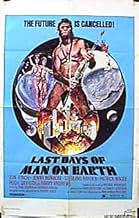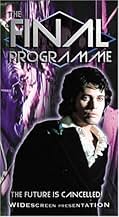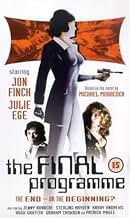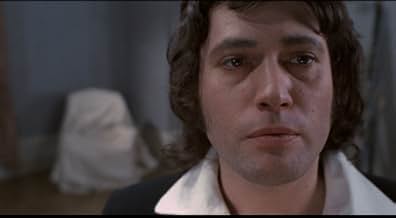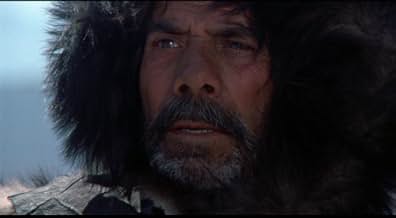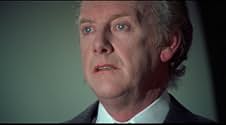IMDb RATING
5.4/10
1.2K
YOUR RATING
A trio of scientists plan to create a self-replicating, immortal, hermaphrodite using the Final Programme developed by a dead, Nobel Prize-winning scientist.A trio of scientists plan to create a self-replicating, immortal, hermaphrodite using the Final Programme developed by a dead, Nobel Prize-winning scientist.A trio of scientists plan to create a self-replicating, immortal, hermaphrodite using the Final Programme developed by a dead, Nobel Prize-winning scientist.
- Awards
- 1 win & 1 nomination total
Sandy Ratcliff
- Jenny
- (as Sandy Ratcliffe)
Mary MacLeod
- Nurse
- (as Mary Macleod)
Delores Delmar
- Fortune Teller
- (as Dolores Del Mar)
- Director
- Writers
- All cast & crew
- Production, box office & more at IMDbPro
Featured reviews
I saw the ads for "The Last Days Of Man On Earth" well before I could watch "R" films, but I was always wanting to see it. It dropped into a bit of obscurity stateside, and it was years before I found a copy. Shortly after I saw it, Anchor Bay issued the uncut original in limited quantities, and I managed to grab one.
well, the book is better. But Jon Finch is the perfect Jerry Cornelius, and this may be his best work. Jenny Runacre is every bit as good as "Miss Brunner", though her character doesn't quite embody the written character to the degree of Finch. Ron Lacey also shines, in a brief turn as the sun glassed assassin, "Shades", walking straight out of the books pages.
The low budget is disguised well, but the film needed a bit more for effects, relying on a lot of color tinting, sound effects, and old style inflatable "sculptures", to fill the screen.
Moorcock hates it, but this embodies the spirit that fueled "New Worlds", the science fiction magazine that brought Moorcock to the worlds attention, rather well, invoking much classic British entertainment of the recent past. The original cut is preferable, but "The Last Days Of Man On Earth" is a completely different edit of the film, not just a retitling. The differences aren't major, but the US removes everything that even borders on superfluous, with much minor trimming being done to almost every scene. In an odd parallel with "A Boy And His Dog", it follows the overall story arc acceptably, but adds a joke in poor taste to the conclusion, and many have found that alone, was enough to sour their perceptions.
It comes close to bringing Moorcocks world to the cinema, but isn't quite there. Here's hoping that someone might make another attempt.
well, the book is better. But Jon Finch is the perfect Jerry Cornelius, and this may be his best work. Jenny Runacre is every bit as good as "Miss Brunner", though her character doesn't quite embody the written character to the degree of Finch. Ron Lacey also shines, in a brief turn as the sun glassed assassin, "Shades", walking straight out of the books pages.
The low budget is disguised well, but the film needed a bit more for effects, relying on a lot of color tinting, sound effects, and old style inflatable "sculptures", to fill the screen.
Moorcock hates it, but this embodies the spirit that fueled "New Worlds", the science fiction magazine that brought Moorcock to the worlds attention, rather well, invoking much classic British entertainment of the recent past. The original cut is preferable, but "The Last Days Of Man On Earth" is a completely different edit of the film, not just a retitling. The differences aren't major, but the US removes everything that even borders on superfluous, with much minor trimming being done to almost every scene. In an odd parallel with "A Boy And His Dog", it follows the overall story arc acceptably, but adds a joke in poor taste to the conclusion, and many have found that alone, was enough to sour their perceptions.
It comes close to bringing Moorcocks world to the cinema, but isn't quite there. Here's hoping that someone might make another attempt.
An ambiguous adventurer becomes involved with an experiment designed to overcome the impending extinction of the human species. One from the "What were they thinking?!" school of film-making: much like John Boorman's contemporaneous ZARDOZ (1974), this is yet another good-looking but uncontrolled attempt at a 'trippy' post-apocalyptic scenario that ends up being embarrassingly campy – and, here, wasting a fine veteran cast (Sterling Hayden, Patrick Magee, George Coulouris, Harry Andrews and Hugh Griffith) into the bargain – none of whom appear in any scenes together. The main role of Jerry Cornelius had been offered to Mick Jagger (who rejected the script as "too weird"!) and Timothy Dalton before Jon Finch stepped in and basically stopped his promising film career dead in its tracks; in hindsight, it is understandable not only that novelist Michael Moorcock hated this adaptation but also that his prolific literary creation never returned in any further cinematic adventure since! For the record, the supporting cast also features Jenny Runacre (as Cornelius' supremely annoying androgynous acolyte), Graham Crowden, Ronald Lacey, Sarah Douglas and Julie Ege...but every earnest effort on anybody's part is stifled by the film's relentless visual and aural assault on the viewers' senses. Interestingly, the former is reminiscent of A CLOCKWORK ORANGE (1971) and the latter features Eric Clapton among the session musicians! When Roger Corman picked up the film for U.S. distribution, he not only trimmed it by 11 minutes but also retitled it as LAST DAYS OF MAN ON EARTH to (reportedly) little effect.
I first saw this film when it came out in 1973, and just watched it for the second time on DVD. Excellent production values and camera work. Stars Jon Finch as androgynous (but heterosexual) dandy-dressing Jerry Cornelius, with black nail polish; looks a bit like a cross between an older Johnny Depp and Billy Zane. Also stars Sterling Hayden, Julie Ege and the evil (duh) Nazi guy from "Raiders of the Lost Ark". The film itself is a cult science fiction fantasy in the best tradition of the late '60's - early '70's, with similarities in style to The Prisoner, early James Bond (slightly), Clockwork Orange, The Abominable Dr. Phibes, and The Avengers (the director worked on the last two of those also). It is years ahead of its time in theme and science, but lapses into camp several times, especially as it progresses. It is rather disjointed, but the acting and sets are both good. Based on a story by Michael Moorcock.
This is one of those spectacular misfires; Fuest has taken Moorcock's splendid book and cut everything down to the bone so much that what remains is only the irrelevant sci-fi plot that was basically a throwaway excuse to hang all the elements of the book together. For this there really is no excuse; the next two books were available at the time the film was in production (the last was not publish until 1977) and if anyone had bothered to read them, they would have realized that Jerry Cornelius ain't James Bond. This a cheap Bond rip-off. The books were trans-dimensional, time hopping wonders; they had an arrogance of plot structure that really captured the complexities of multi-dimensional realities. This is a chase movie. It has a conventional three-act structure and, worst still, it ditches all the characters vital to the novel (or amalgamates three, four or five of them into one). It misses out on Moorcock's views of sexual liberation and worst of all Fuest has absolutely no idea what his source material is about. After seeing the Dr. Phibes movies I thought him to be an entertaining and imaginative director. After seeing this I realize his style has nothing to do with imagination but a talent for making do with low budgets. The Final Programme was made for around £600,000. Not inconsiderable for the time but it is wasted in every frame on trivia. For example, an early chapter of the book revolves around a massive assault on Jerry's father's Chatauex in Normandy by a team of crack armed mercenaries with hundreds of casualties; here it is reduced to a bit of mild house breaking just outside London. Jon Finch's Cornelius is the only plus point about it (he was, after all, a friend of Moorcock) and what the books really need is $400 million throwing at them (they have to be filmed back-to-back), faithful adaption, and a director like Alejandro Jodorowsky. The books have recently been reissued in a bind-up as "The Cornelius Quartet". Read them; you'll be going back to them for years to come trying to unravel all the different strands. The film has no strands.
A shortened version of the film first released as The Final Programme, from Michael Moorcock's novel of that name. Jerry Cornelius is the perfect universal hero/anti-hero in a disintegrating world. His search for his father's invention involves him with his mad brother Frank and the sinister programmer, Miss Brunner. The acting is over the top (one reviewer described it as "rug-chewing"), hip, and outrageous. The flip, self-mocking style owes a great deal to The Avengers, The Prisoner, and possibly even the Beatles.
Did you know
- TriviaA few years after making this film, Sterling Hayden was interviewed for a British magazine and insisted that Robert Fuest was his favorite director, the best he had ever worked with. As Hayden has only one scene in this film, and almost certainly took no longer than a couple of days to film it, perhaps less, and as he also spoke in the same interview about his work with Stanley Kubrick, John Huston, Bernardo Bertolucci, Robert Altman and Nicholas Ray, it may be that he was being sarcastic.
- Quotes
Nurse: It's much easier to run a hospital with all the patients sleeping.
Jerry Cornelius: Easiest way to run the world, for that matter.
- ConnectionsFeatured in Nightmare Theatre's Late Night Chill-o-Rama Horror Show Vol. 1 (1996)
- How long is The Final Programme?Powered by Alexa
Details
Contribute to this page
Suggest an edit or add missing content

